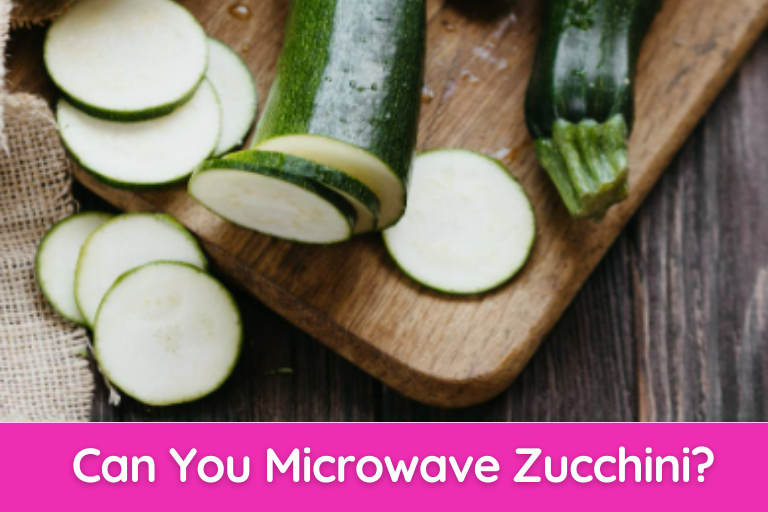Are you looking for a new way to enjoy Zucchini? Then you’re in luck! Introducing “Can You Microwave Zucchini?” is the perfect solution for adding flavor and nutrition to your meals.
In no time, you’ll be cooking delicious dishes packed with vitamins and minerals thanks to this amazing new technique.
So why wait? Give it a try today and start enjoying healthy meals full of flavor!
Can You Microwave Zucchini?
Yes, you can microwave Zucchini! It’s an easy and quick way to cook this vegetable. Place the sliced Zucchini in a microwave-safe dish, add a bit of water or oil, cover it with a damp paper towel, and then cook it on high power for two to three minutes. The result will be delicious, tender Zucchini ready, topped off with your favorite sauce or seasoning. Enjoy!
How do you steam Zucchini in the microwave without a steamer basket?
Steaming Zucchini in the microwave without a steamer basket is easy! All you need to do is cut the Zucchini into even-sized chunks and place them on a plate. Then, add 1 tablespoon of water to the plate and cover it with a damp paper towel. Microwave the Zucchini for 3-4 minutes until it’s tender. Serve and enjoy!
What is the best way to eat Zucchini?
Zucchini is a great way to get vitamins and minerals into your diet. The best way to enjoy it is to cook it in various delicious ways – from roasting, grilling, and sautéing to steaming, stir-frying, and microwaving.
No matter how you prepare it, you’ll be sure to satisfy your taste buds while getting the nutrition you need. So get cooking!
Can you warm up the Zucchini?
Absolutely! Zucchini tastes great when warmed up. Whether microwaving, grilling, or roasting the Zucchini, the key is to cook it until it’s just tender – usually about 5-7 minutes. Enjoy!
How do you dehydrate Zucchini in the microwave?
You can quickly dehydrate Zucchini in the microwave. Here’s how:
- Slice the Zucchini into thin slices or rounds.
- Place the slices onto a plate lined with paper towels and cover them with another paper towel.
- Place the plate in the microwave and cook on high for 2 minutes.
- Remove the plate from the microwave, flip each piece over, and cook for 2 minutes on high power.
- Repeat up to 5 times until all moisture is removed from the zucchini slices, and then let cool before serving or storing for later use.
Why does Zucchini spark in the microwave?
Zucchini (along with other vegetables) can spark in the microwave due to its high water content. The sparks are created when a piece of Zucchini is exposed to microwaves, which causes the water molecules to vibrate quickly and generate an electrical discharge. To prevent sparking, ensure your zucchini slices are evenly sliced and spread them out on a plate before cooking.
What is the healthiest way to eat Zucchini?
The healthiest way to eat Zucchini is raw or lightly cooked. It’s a great source of dietary fiber, vitamins A and C, and potassium. Zucchini can be eaten raw with dip as a snack, made into salads, stir-fried with other vegetables, or cooked into casseroles. For a healthy breakfast or lunch, try adding slices of zucchini to an omelet or wrap.
Should I peel Zucchini before eating?
No, you don’t need to peel Zucchini before eating. The skin is edible and provides an excellent dietary fiber and antioxidant source. You can also leave the skin on for added texture and flavor when cooking or grilling Zucchini.
Does cooked zucchini cause gas?
Cooked Zucchini does not cause gas. Eating raw, crunchy vegetables like Zucchini can lead to increased flatulence, but cooking it can reduce this effect. Zucchini contains raffinose, a type of sugar broken down by bacteria in the large intestine, leading to gas production and bloating. Cooking breaks down these sugars, making it easier for your body to digest them.
Does Zucchini need to be fully cooked?
No, Zucchini doesn’t need to be fully cooked. It can be eaten raw or partially cooked, depending on your preference. Raw Zucchini has a fresh flavor and crunchy texture, while lightly steamed or sautéed Zucchini still has a slight crunch but is more tender and flavorful.
When should you not use Zucchini?
You should not use Zucchini if it is spoiled or rotten. Signs of spoilage include discoloration, soft spots, and a sour smell. Additionally, it would help if you did not use Zucchini that has been pre-cut into slices or cubes, as this will reduce its freshness and flavor.
What’s the best way to get the moisture out of Zucchini?
The best way to get the moisture out of Zucchini is by salting it. To do this, cut the Zucchini into slices or cubes and sprinkle with a generous amount of salt. Let it sit for at least 30 minutes, then drain off any liquid that has been released. You can also wrap the pieces in a clean kitchen towel and squeeze them to remove excess moisture.
What can I do with too much zucchini?
If you have too much zucchini, you can make several delicious recipes with it. Some ideas include:
- Zucchini Bread
- Zucchini Muffins
- Zucchini Fritters
- Zucchini Lasagna
- Roasted Zucchini with Herbs
- Baked Zucchini Chips
Why is my cooked Zucchini mushy?
If your cooked Zucchini is mushy, it may be because you overcooked it. Zucchini should only be cooked until tender, not until soft. Additionally, Zucchini releases a lot of liquid when cooked, making it mushy. To avoid this, try cooking with less water or at shorter intervals.
Why do you soak Zucchini before cooking?
Soaking Zucchini before cooking helps remove some bitterness and soften it. It also helps to reduce the amount of liquid released when cooked, preventing the Zucchini from becoming too mushy. To soak zucchini, cover it with cold water and let it sit for 10-30 minutes before using.
Does boiling zucchini remove nutrients?
Boiling Zucchini can cause some nutrients to be lost in the cooking water. To minimize nutrient loss, try steaming or roasting instead. You can also blanch Zucchini briefly in boiling water before using it in a recipe. This helps to preserve more of its vitamins and minerals.
What vegetables can be microwaved?
Many vegetables, such as broccoli, carrots, cauliflower, sweet potatoes, spinach, and peppers, can be successfully cooked in the microwave. Cut vegetables into evenly sized pieces to ensure they cook evenly. Place vegetables in a microwavable dish and add a small amount of water or broth. Cover with a lid or plastic wrap, leaving one corner open for steam to escape. Cook on high for 5-10 minutes, stirring every few minutes as needed.
Which is healthier, cucumber or zucchini?
Cucumbers and zucchini are good sources of vitamins, minerals, and dietary fiber, so it can be difficult to say which is “healthier.” Cucumber has fewer calories but also fewer vitamins and minerals than zucchini. Conversely, Zucchini provides more potassium and vitamin A. Ultimately, both are healthy and nutritious vegetables that should be included in a balanced diet.
Is cooked Zucchini hard to digest?
Cooked Zucchini is generally considered easy to digest. As with other vegetables, cooking helps to break down cell walls and makes it easier for the body to absorb nutrients. Additionally, the fiber content in cooked Zucchini can help with digestion.
How do I prepare zucchini for eating?
You can prepare zucchini for eating in many different ways. It can be steamed, boiled, stir-fried, roasted, or grilled. The outer skin of the Zucchini is edible and does not have to be removed before cooking.
For a quick meal, you can slice it thinly and fry it in oil or butter for a few minutes until lightly browned. You can also add it to stews and soups, shred it into salads or noodles, or stuff it with filling such as cheese or grains.
Does Zucchini clean your stomach?
Zucchini is not known for cleansing the stomach, but it can help digestion. Eating Zucchini is a good source of dietary fiber, which helps improve digestion and keep your intestines healthy. Zucchini also contains other vitamins and minerals that may help cleanse the body.
Is it OK to eat Zucchini raw?
Yes, it is safe to eat Zucchini raw. Zucchini can be enjoyed in salads, wraps, and as a snack. Raw Zucchini has a mild flavor and is crunchy and refreshing. It is also high in vitamins A and C, dietary fiber, and antioxidants.
How do you not overcook Zucchini?
To prevent Zucchini from becoming overcooked, it is important to monitor its cooking time. It should be cooked for the best results until the Zucchini is tender but still crisp. To cook Zucchini, it can be boiled, steamed, grilled, or sautéed. It is essential to avoid cooking the Zucchini for too long as this can cause it to become soggy and lose some of its nutritional value.
Why do I feel sick after eating Zucchini?
It is possible to feel sick after eating Zucchini. This could be due to an allergy or intolerance, toxins in the food, or a digestive issue caused by overeating. If you are experiencing nausea, vomiting, or abdominal pain, it is important to speak to your doctor for further advice.
Why does cook Zucchini hurt my stomach?
Cooked Zucchini may hurt your stomach due to an allergy or intolerance, toxins in the food, or a digestive issue caused by overeating. If you experience stomach pain after eating cooked zucchini, you must speak with your doctor for further advice.
What does Zucchini do to your stomach?
Zucchini can have various effects on your stomach. These could include digestive issues caused by overeating, an allergy, or sensitivity resulting in symptoms such as nausea, abdominal pain, vomiting, or toxins in the food. If you experience these symptoms after eating zucchini, it is important to speak to your doctor for further advice.
How do you tell if Zucchini is cooked?
To tell whether Zucchini is cooked, look for signs of tenderness. Zucchini should be fork-tender when fully cooked – you can easily insert a fork into the flesh, and it will pierce through with little to no resistance. Other indications of doneness include a golden-brown color in cooked Zucchini and an intense fragrance wafting from the dish.
Should you refrigerate Zucchini?
It is recommended to refrigerate Zucchini, which helps preserve its freshness and moisture. To store it correctly, wrap the Zucchini loosely in a paper bag and place it in the crisper section of your refrigerator. This will help keep it fresh for up to five days.
Why does my Zucchini taste like chemicals?
If your Zucchini tastes like chemicals, it may be a sign that it has been sprayed with an insecticide or other chemical. Be sure to buy organic Zucchini to avoid this problem. Additionally, washing all produce thoroughly before consuming is important, as this will help remove any potential pesticides from the surface.
Should Zucchini be salted before frying?
It is recommended to salt zucchini before frying, as it helps draw out moisture and enhance the flavor. To do this, sprinkle a generous amount of salt over the zucchini slices, place them on a paper towel-lined plate, and let them sit for at least 10 minutes before frying. This will help ensure that your zucchini fries are crispy and flavorful.
Why is my zucchini slice soggy?
If your zucchini slices are soggy, there may be a few reasons. -The Zucchini you are using may still need to be ripe, so it’s best to wait until they are fully ripened before slicing and frying. -You may have over-salted the Zucchini, which will cause too much moisture to be drawn out and lead to a soggy finish.
You may have fried the slices at too low of a temperature or for too long, causing them to become soft and soggy. -You may have used too much oil when frying, which can lead to soggy results.
How long should you sweat, Zucchini?
Sweating Zucchini is a crucial step to ensuring a crispy fried result. To sweat your zucchini slices, place them on a paper towel-lined plate, sprinkle them with salt, and let them sit for at least 10 minutes. When fried, this will help draw out excess moisture and give you the perfect crunchy texture.
Why do you sweat, Zucchini?
Sweating Zucchini helps draw out excess moisture, producing a crispier texture when fried. You can get a better fry and avoid soggy results by removing the excess moisture. Sweating also helps reduce the amount of oil absorption while frying. Sweating is also a good way to season the zucchini slices before frying, and it also helps with browning.
What is the best way to eat Zucchini?
The best way to eat Zucchini is to pick the freshest, greenest Zucchini you can find. From there, you can decide to eat it raw or cooked. Raw zucchini slices make a great snack with a dip of your choice, and cooked Zucchini adds a delicious flavor to any dish. Whether grilled, stir-fried, roasted, or sautéed, Zucchini adds excellent texture and flavor to any meal.
Is Zucchini an inflammatory?
Zucchini has anti-inflammatory properties due to its high levels of antioxidants. In addition, it contains essential vitamins and minerals that can help reduce and prevent inflammation. Zucchini also has a low effect on blood sugar levels and is a good source of fiber, which can help reduce the risk of chronic inflammation.
Is cooked Zucchini good for weight loss?
Yes, cooked Zucchini can be a great addition to your weight loss plan. Zucchini provides essential vitamins and minerals that are important for healthy weight loss. It is low in calories yet packed with fiber, which helps you feel full longer and maintain a healthy weight. Plus, it adds texture and flavor to any dish without adding extra fat or calories.
Conclusion
Zucchini can be a great addition to any diet, whether raw or cooked. It is low in calories yet packed with essential vitamins and minerals that can help reduce inflammation and blood sugar levels and aid weight loss.
Whether you fry it up as zucchini fries or grill them for an outdoor summer cookout, there are many ways to enjoy this versatile vegetable! What’s your favorite way of cooking Zucchini? Let us know in the comments below – we’d love to hear from you!




